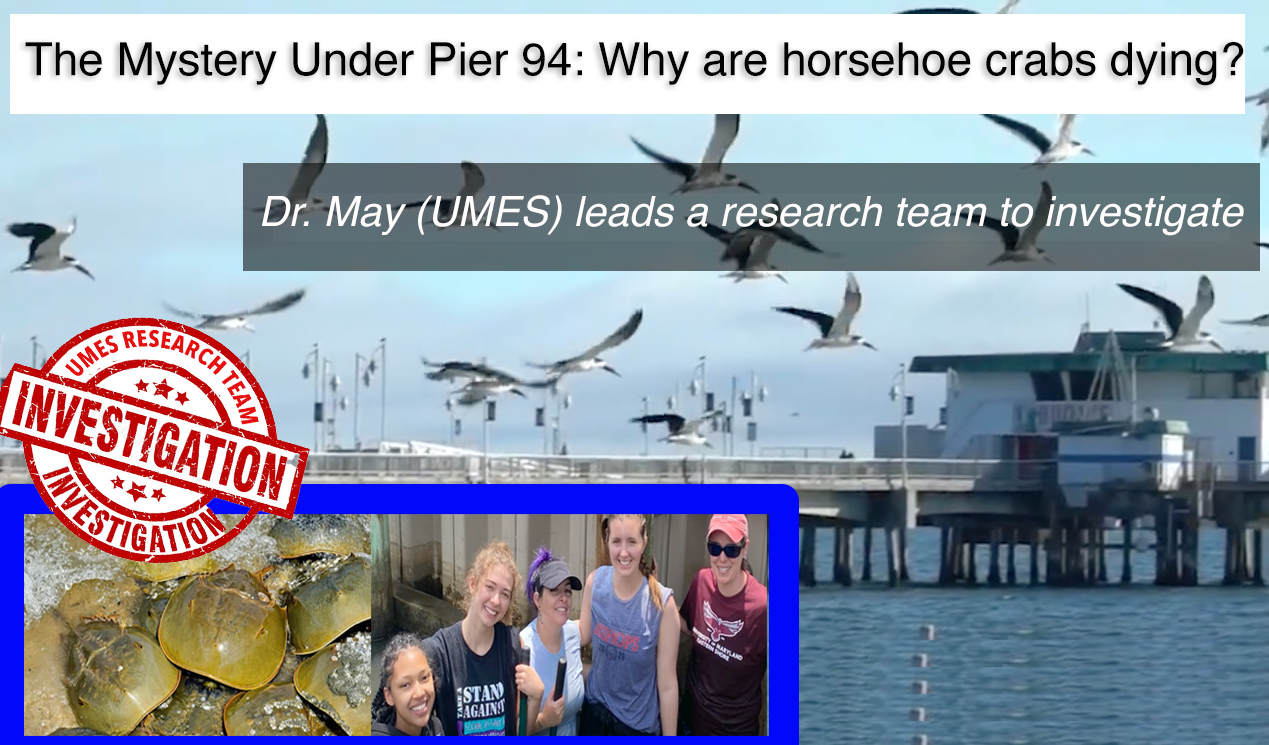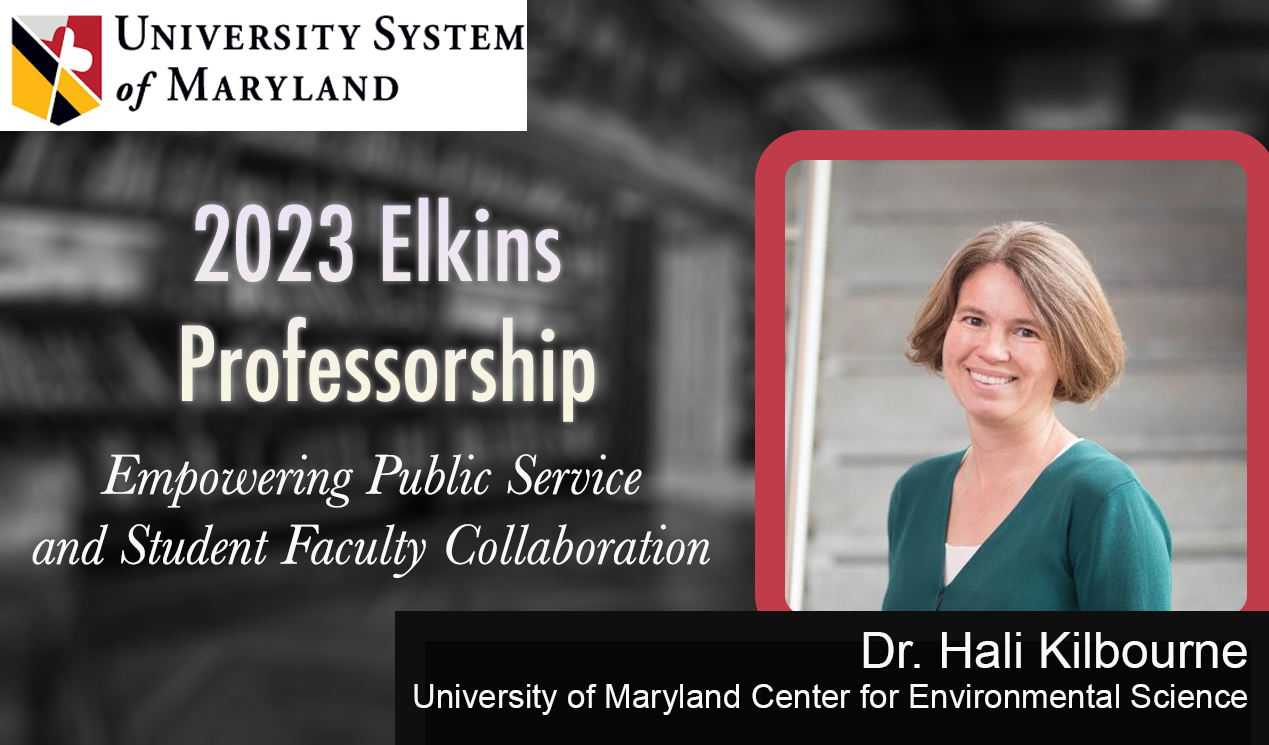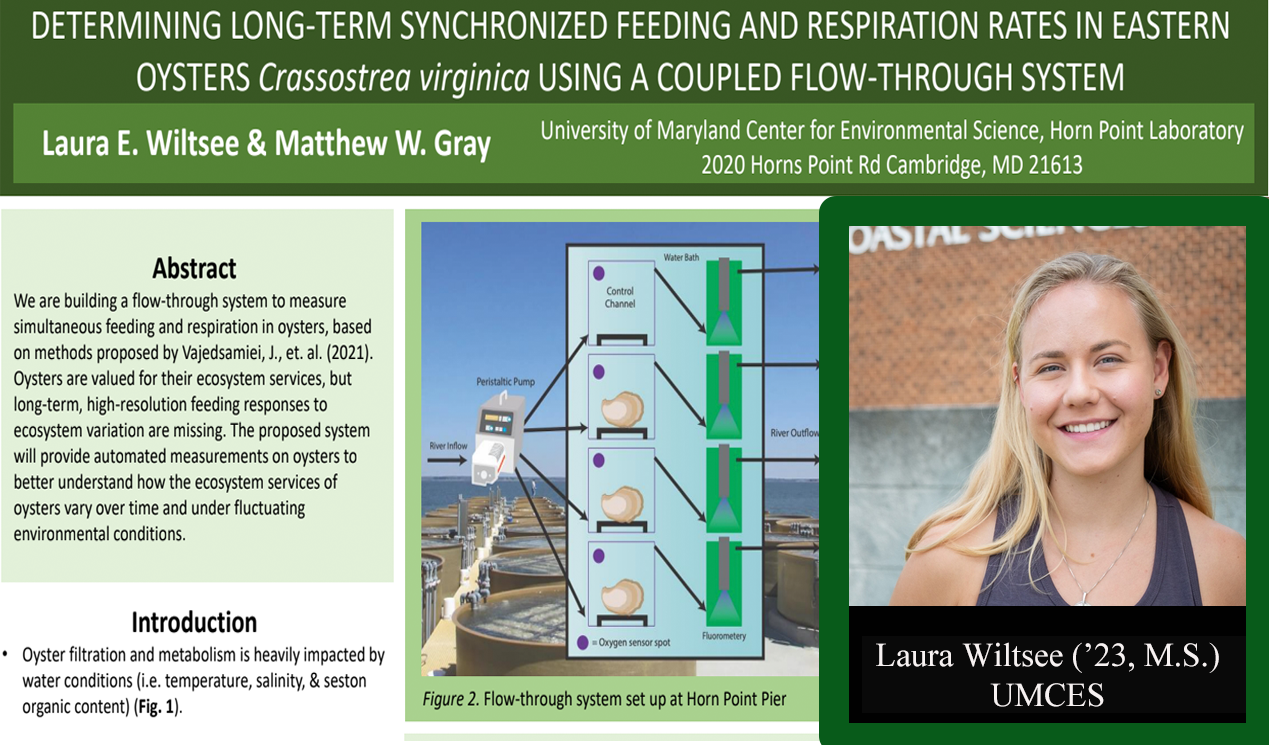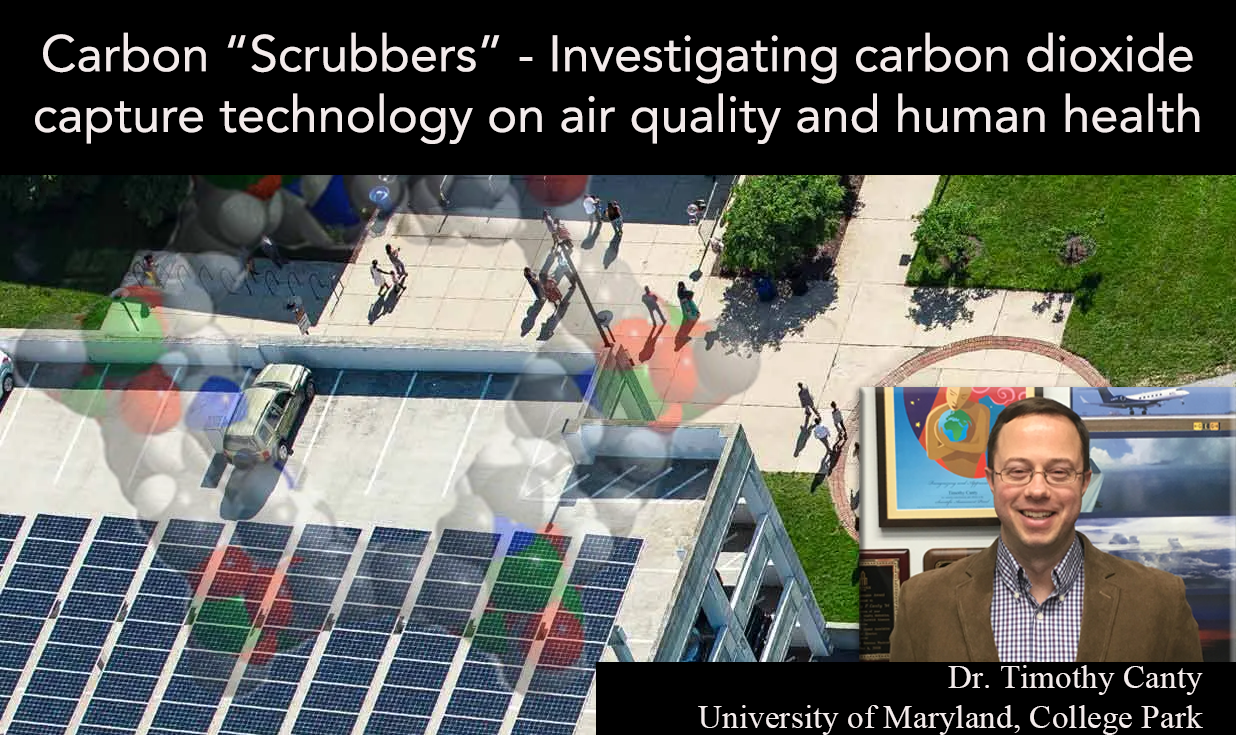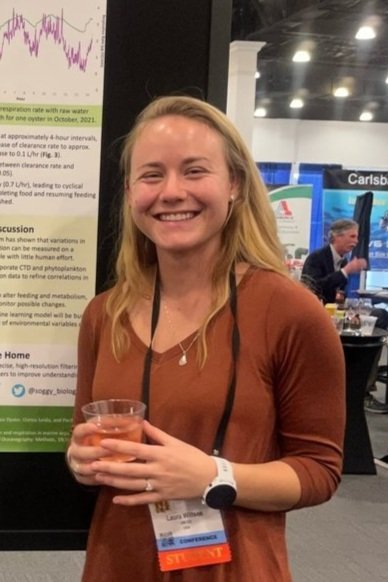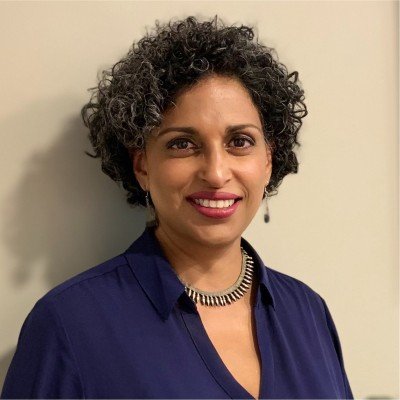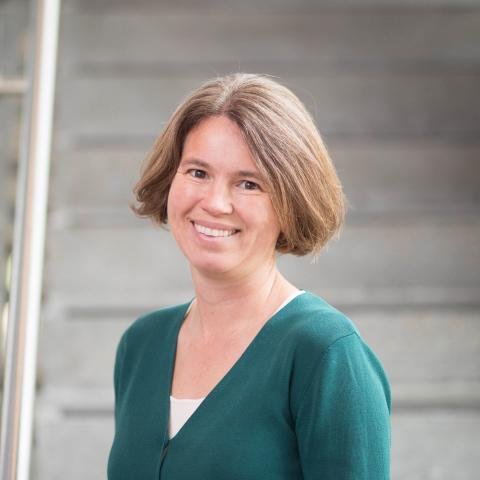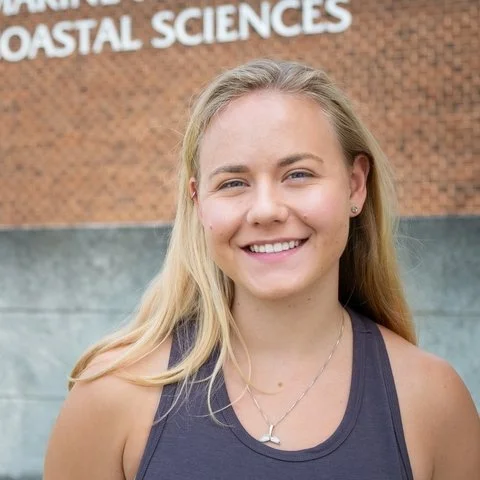MEES GRADUATE PROGRAM STUDENT ORIENTATION - FALL 2023
MEES Graduate Student Orientation Online - 08/23/2023 @ 9a.m. (via Zoom)
Please check with your home institution for more orientation events.
ALUMNI CORNER
MEES RESEARCH CENTER
Laura Wiltsee Photo Courtesy: UMCES/HPL
Laura Wiltsee (‘23, ECOL SYS) recently defended her thesis and graduated this month (Summer 23) with a M.S. in MEES at the University of Maryland Center for Environmental Science. Advised by Dr. Matthew Gray, Laura’s thesis research focused on bivalves, who are prized for the ecosystem services they provide in the removal of particles from the water column through filter feeding; resulting in many water quality benefits.
Dr. Vandana Rao
Dr. Vandana Rao (M.S., ‘97) is the Director of Water Policy for the Massachusetts Executive Office of Energy and Environmental Affairs (EOEEA), the Executive Director of the Massachusetts Water Resources Commission and a MEES alumni.
faculty focus
2023 Elkins Professorship - Dr. Hali KiLbourne (UMCES)
Dr. Hali Kilbourne Photo Courtesy: UMCES/CBL
August 11, 2023 - The MEES Program would like to congratulate our very own Dr. Hali Kilbourne (UMCES), based at the Chesapeake Biological Laboratory, who recently received from the University System of Maryland (USM) the prestigious and highly distinguished USM Elkins Professorship, for fiscal year 2024, established in 1978 as the first permanently endowed, university-wide professorship at the University of Maryland. Dr. Kilbourne, a long time MEES faculty member, is a climate scientist with expertise in paleoclimatology. She uses natural archives of past climate to better understand climate processes occurring over centuries to seasons. Recently she works on understanding links between climate change and deep overturning circulation in the Atlantic to answer the question, “Has overturning already started to slow down because of anthropogenic warming?” Dr. Kilbourne is a specialist in using fossil coral geochemistry to reconstruct past climate variability and better understand the major controls on climate variability. This line of research has led to studies of seawater geochemistry with UMCES and MEES collaborator, Dr. Johan Schijf, to improve coral-based climate reconstructions. This Elkins Professorship will help support Dr. Kilbourne’s efforts to fully implement the MEES Learning Outcomes Assessment (LOA) Plan [MEES LOA Report Appendix B]. She will be conducting site visits this academic year for all MEES students and faculty to foster community discussion and solicit feedback on MEES LOA activities.
The professorship is named after Wilson H. Elkins, a former Rhodes scholar who served as President of the University of Maryland from 1954 to 1978. This professorship funds help support compelling projects with focus on research, scholarship, or community engagement. The MEES Graduate Program is so very proud of our faculty whose exemplary skills, leadership, creativity, and mentoring have been recognized! Congratulations, Dr. Kilbourne, this is a well earned appreciation and acknowledgment of all your hard work! For more on Dr. Kilbourne, please click here.
Back to Top
MEES RESEARCH CENTER
DETERMINING FEEDING RATES IN EASTERN OYSTERS (Crassostrea virginica) USING NATURAL SESTON FLOW-THROUGH SYSTEM
Laura Wiltsee Photo Courtesy: UMCES/HPL
Laura Wiltsee (‘23, ECOL SYS) recently defended her thesis and graduated this month (Summer 23) with a M.S. in MEES at the University of Maryland Center for Environmental Science. Advised by Dr. Matthew Gray, Laura’s thesis research focused on bivalves, who are prized for the ecosystem services they provide in the removal of particles from the water column through filter feeding; resulting in many water quality benefits. Laura’s proposal leverages advances in semi-autonomous aquatic observing to track high-resolution, long term feeding responses of bi-valves to subtle variations in environmental conditions using the Eastern Oyster (Crassostrea virginica) as a model species. Prior to joining the MEES Program, this Philly native and licensed diver earned her B.S. in Marine Biology & Biological Oceanography with a Minor in Ecology, Evolution & Natural Resources from Rutgers University in Fall 2020. During her time in Rutgers, Laura participated in extensive field, lab, and data processing work, working first with historical data sets collected along New Jersey river waterways, and then joining Rutgers underwater glider team where she joined Dr. Grace Saba’s lab to work on the integration of the first pH sensor placed into a glider. This project fueled her passion and interest in ecological studies by examining the regional effects of natural variation of acidification on two commercially important shellfish: Atlantic Sea Scallop and Atlantic Surf Clam. Laura had the opportunity to present this research at an international glider conference at Rutgers and at a student research conference at the University of Sao Paulo in Brazil. Laura continued to develop her adept scientific skills in summer research projects in Northern Mongolia (impacts of hydroelectric dam on the migratory patterns of the local freshwater fish), and the Antarctic (polar marine biome research). Since joining the MEES program, Laura has presented a poster at the joint World Aquaculture Society, the National Shellfishes Association, & United States Aquaculture Society Conference in San Diego, CA in March 2022 where Laura won the best poster award at that conference. Laura recently attended the National Shellfishes Association Conference in Baltimore, MD in March 2023. Laura also has won numerous awards including the Graduate School Dean’s Fellowship (2020), the MEES Graduate Program Fund (2020), and the CRSSA Grant (2021). For more information on Laura’s conference presentation, please click here.
Back to Top
INVESTIGATING CARBON CAPTURE TECHNOLOGY ON AIR QUALITY AND HUMAN HEALTH
Dr, Timothy Canty Photo Courtesy: UMCP/AOSC
July 6, 2023 - Dr. Timothy Canty is Director of the Marine Estuarine & Environmental Science Program, Associate Professor in the Department of Atmospheric & Oceanic Science (AOSC), and co-director of AOSC’s Professional Master’s Degree program at the University of Maryland College Park. Dr. Canty has served as Director of MEES since 2019, and most recently in April along with several other departments on the College Park campus submitted a joint proposal which was selected by the University of Maryland Grand Challenge Program to receive an Institutional Grant of $3M over three years to utilize a “research to impact” philosophy in addressing: extreme weather, natural disasters in a changing world, agricultural and food security, as well as air and water quality. Dr. Canty, in a CMNS feature article, recently received funding from the U.S. Department of Energy (DOE) to identify the ways in which carbon “scrubbers” could benefit the environment and human health. Dr. Canty's research focuses on air quality science and policy, stratospheric ozone, and climate change. “If you want to tackle climate change, “ as Dr. Canty explains in the article, “you have to either stop putting greenhouse gases in the air, remove greenhouse gases from the air or turn down the sun”. A UMD research team led by Dr. Canty, are studying the potential benefits of “taking out” carbon dioxide from the atmosphere through carbon capture technology using a computational model to forecast air quality levels if carbon capture systems are installed in areas that emit high levels of greenhouse gases like power plants, cement production facilities and other industrial sites. The goal is to use that model to predict air quality improvements at the city, or even neighborhood level. Dr. Canty and his team also aim to identify any economic costs or savings associated with carbon capture, with future collaborations with epidemiologists to identify the technology related health outcomes as well. For more on Dr. Canty and his team, please click here.
Back to Top
ALUMNI CORNER - Dr. Vandana RAO
Dr. Vandana Rao
Dr. Vandana Rao (M.S., ‘96) is the Director of Water Policy for the Massachusetts Executive Office of Energy and Environmental Affairs (EOEEA), the Executive Director of the Massachusetts Water Resources Commission and has extensive experience in policy development and analysis on water resources as well as climate change adaptation and resilience. She is also a MEES alumni, advised by the late Dr. Gian Gupta, earning her MS in MEES from the University of Maryland Eastern Shore in 1996 before earning her Ph.D. in Environmental Science & Policy from the University of Massachusetts-Boston in 2002. Dr. Rao has over 20 years of experience in (among others) draught management; watershed related planning, water quantity and quality improvements, and habitat protection and restoration. Dr. Rao provided extensive experience in policy development and analysis on Water Resource, and Climate Change Adaptation and Resilience issues and also provides expertise and advise to the Secretary of the EEA.
Back to Top
THE MYSTERY UNDER PIER 94: MONITORING HORSEsHOE CRAB MORTALITY
Photo Courtesy: UMES
August 14, 2023 - Dr. Eric May is a Professor of Fish Biology & Pathology in the Department of Natural Sciences at the University of Maryland Eastern Shore (UMES). Dr. May, a long time MEES faculty member, not only actively mentors current MEES students but is also the MEES UMES Program Committee Representative, and has long served on the MEES admissions committee. Dr. May and his research team were recently featured across many media outlets regarding a research investigation into Ocean City horseshoe crabs. This past summer, the Maryland Coastal Bay Program requested help from UMES to identify the cause of horseshoe crab deaths in the canals near 94th street in Ocean City. According to a local feature, in 2021, hundreds of dead horseshoe crabs washed up in bayside canals near 94th Street, with some instances resulting in the disposal of multiple dumpsters full of horseshoe crabs. This pilot study is aimed at identifying the cause and as monitoring continues, they are reminding residents and visitors to remain vigilant of any dead crabs found along the bayside. During a local broadcast feature, Dr. Eric May said, “It’s a matter of people keeping their eyes open, and if they see dead crabs to report them.” The UMES research team consists of Dr. Eric May, MEES alum Dr. Maggie Sexton (‘12, Ph.D.), Dr. Bill Weaver, and also an incoming Fall 2023 MEES M.S. graduate student Renee Thompson (‘23, ECOL SYS) as well as UMES undergraduates in the REU program.
Despite horseshoe crabs being one of Earth’s oldest species, predating the dinosaurs, currently only four (4) species remain. Out of those four, only one (1) can be found outside of Asia, and it is in the Maryland Coastal Bays (MCB’s). Horseshoe crabs are a valuable part of the marine ecosystem serving as prey for sea turtles, alligators, horse conchs, and sharks. Horseshoe crabs are also extremely important to the biomedical industry because their unique, copper-based blue blood contains a substance called "Limulus Amebocyte Lysate"used to test and develop medicines, vaccines, implants and more. For more information, the research team has a website and a YouTube channel where more information on this important study can be found.
Back to Top
Please contact us with feedback and ideas for future features!
